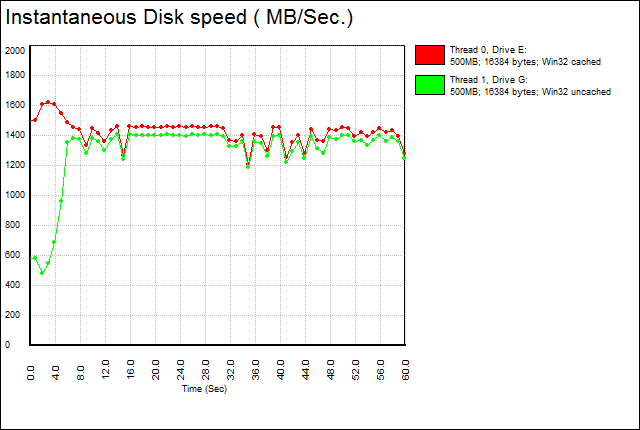We’ve recently been investigating the cause of outrageously high (20,000+) disk scores for the Samsung EVO range of SSDs. It turns out to be caused by a service provided by Samsung called RAPID, which is effectively a replacement/addition to the normal Windows disk caching. (this is part of the Samsung Magician software package).
However the big difference is that when RAPID is running it bypasses any request to disable disk caching thereby invalidating the PerformanceTest disk test. From what we have seen in a few tests it doesn’t actually do much more than the inbuilt Windows disk cache (there may be some long term differences that we haven’t seen).
The no-cache request is set in the Microsoft API function CreateFile, with the FILE_FLAG_NO_BUFFERING flag. Their device driver seems to incorrectly ignore this. Which is bad for applications that either do their own caching or can't afford to loose data in the case of a power failure. We can only guess they did this deliberately to artificially inflate their performance numbers, but increasing the risk of data corruption. (The cynical among us suspect this is a deliberate attempt to cheat benchmarks. While providing no real performance gain. Samsung has some form with benchmark cheating).
Here is comparison of two SSDs using the advanced disk test, Drive E is using Win32 cached mode test while Drive G, the Samsung EVO with RAPID mode enabled, is running the Win32 uncached. As you can see it closely follows the results of the standard windows disk cache. If anything the "RAPID" software slows down the disk access (as compared to the Windows standard disk cache).

In the next build of PerformanceTest (V8.0.Build 1029 - 14th/January/2014) we will be detecting if the RAPID service is running and if a baseline was created using a Samsung drive while the service is enabled we will disable the upload function until the RAPID service is turned off.
The disk tests can still be run but we want to avoid having a number of artificially high scores raising the average for these drives.
However the big difference is that when RAPID is running it bypasses any request to disable disk caching thereby invalidating the PerformanceTest disk test. From what we have seen in a few tests it doesn’t actually do much more than the inbuilt Windows disk cache (there may be some long term differences that we haven’t seen).
The no-cache request is set in the Microsoft API function CreateFile, with the FILE_FLAG_NO_BUFFERING flag. Their device driver seems to incorrectly ignore this. Which is bad for applications that either do their own caching or can't afford to loose data in the case of a power failure. We can only guess they did this deliberately to artificially inflate their performance numbers, but increasing the risk of data corruption. (The cynical among us suspect this is a deliberate attempt to cheat benchmarks. While providing no real performance gain. Samsung has some form with benchmark cheating).
Here is comparison of two SSDs using the advanced disk test, Drive E is using Win32 cached mode test while Drive G, the Samsung EVO with RAPID mode enabled, is running the Win32 uncached. As you can see it closely follows the results of the standard windows disk cache. If anything the "RAPID" software slows down the disk access (as compared to the Windows standard disk cache).

In the next build of PerformanceTest (V8.0.Build 1029 - 14th/January/2014) we will be detecting if the RAPID service is running and if a baseline was created using a Samsung drive while the service is enabled we will disable the upload function until the RAPID service is turned off.
The disk tests can still be run but we want to avoid having a number of artificially high scores raising the average for these drives.

Comment